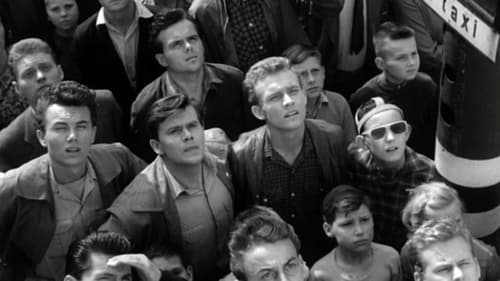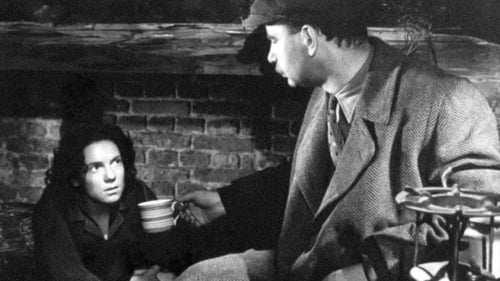Marie Ježková
Nascimento : 1901-02-01, Červená Řečice, Czech Republic
Morte : 1960-04-06

Director
Hansel and Gretel went into the woods with their dad, but he hid from them so he could film them with a hidden camera. In the meantime, the entire adult population in the whole world (including their father) died from an unknown illness. The only thing that remained of him was several reels of exposed film. The children were left alone in the world. With no future, no faith, no hope... A self-therapeutic film from a beautiful era when most people disappeared behind the walls of their homes and were afraid to come out.

Cepelková
Based on the only extensive prose work by the surrealist painter Josef Capek, Shades of Fern most resembles the philosophical fairy tales and fables of Josef’s older brother, the legendary Czech novelist and playwright Karel Capek. Two young poachers, more boys than men, kill a gamekeeper when they are caught illegally hunting. Panicked, they retreat into a forest that grows steadily more forbidding and deadly as their fear for the future—and guilt over their action—mounts. Loosely based on hundreds of oral folk tales and legends that haunt the woods of Czechoslovakia, Vlácil’s contemporary updating artistically underscores the relationship between man and nature, crime and punishment, isolation and society, and guilt and memory.

May 1945. On the outskirts of Prague, ordinary people meet Soviet soldiers-liberators with tears of joy in their eyes. In the early days of the lull, someone sadly recalls a pre-war life; someone unexpectedly meets his love; someone is returning from enemy dungeons looking hopefully into the future; and someone, having moved from a tank into a Czech tram, warmly recalls his craft as a car driver... These days, all those who survived the Great War fire swear an oath to keep peace on Earth forever, honoring the memory of those who gave their lives for simple human happiness.

Old women
Explores young adults' fears of being conscripted by the communist government into working outside of Prague, a relative oasis of creativity and freedom of thought. From an early script by Milos Forman.

Bláhová, Pepík's mother

Vanek's wife

Cooperative members are harvesting crops, trying to get new water piping installed and preparing to plough away the field boundaries in autumn. Local kulak Voznica (Vladimír Repa) doesn't like any of this so he forces sexton Kodýtek (Vlasta Burian) to help him sabotage their efforts.

Látová
The Trap (Czech: Past) is a 1950 Czech drama film directed by Martin Frič. It was entered into the 1951 Cannes Film Festival.

Grammar school teacher Bláha hurts himself in pursuit of a red lizard, and is lying unconscious in the lonely house of Santrucek family. The postman, who found Bláha's coat and hat in the water, announces to everyone in town that the professor has drowned. But, the venerable citizens are at that moment more interested in the theatre group with the beautiful guest actress Eva Gazdová. They demand a change of repertoire and manage to persuade the theatre manager to have the group play the musical comedy The Red Lizard instead of an established play.

Five crime stories connected by the narration of police superintendent Bartosek.

Leopold Kohák married a rich widow a long time ago and now has nothing to do compared to his energetic wife. He's growing old and troubled by the fact that he betrayed his first love Emča and his beloved river Sázava where he spent his childhood and youth. A visit from an old friend Lebeda brings it all back to him. After a nervous breakdown Leopold secretly visits his home instead of going to the spa. A wandering tramp suggest Leopold should bathe in the magical waters of the Sázava, and slowly his youth returns to him.

Prague, the beginning of the 17th century. Rozina falls in love with Italian glass worker Nikolo, but after returning home, she gets a message that will never come to Prague. She falls for the promise of an older man to marry her, but when Nikolo does return, the tragic fate of Rozina is sealed.

Barbora
When Vilem appears in the road with an unconscious young woman, it disturbs the peaceful life of three generations of the Balvínova family.

mistrová

třídní septimy

A morally questionable lord comes to the aid of a working class man who is to be executed for speaking out about thieving rich scoundrels sticking it to the poor.

Barča
The doomed love of a city girl caught in the vise of poverty is detailed in Vavra’s fluid, romantic work, one of the most elegant creations of the Czech Modernist era... The film lingers over its characters’ habitats and haunts, finding psychological truths in what each owns or desires, and countering every Hollywood-ready scene of gleaming restaurants and dazzling penthouses with realist moments of employment lines and crammed flats. Vavra’s classical camerawork and aura of romantic defeatism give Virginity a force comparable to the master of this genre, Hollywood’s Frank Borzage. (BAM/PFA)


Madla - maid at Karas
Professor Karas is widely known as enthusiastic propagator of the motto "Morality Above All Else". He guides his students as well as his own family to live a morally decent life. One day he has an unexpected visit. It's his illegitimate daughter Vera, who is proof of his thoughtless youth. Mr. Karas know that she can ruin his image, thus he decides to keep her a secret and asks her to leave. Instead of leaving she takes a position of a governess in his own family without letting him know. Mr. Karas realizes that he must reveal the truth sooner or later, but he doesn't have enough courage to do so. As he postpones it, he is more and more scared to come to his own home.

Slightly ironic comedy of wretches, who come to understand the rich and are able to accept charity, and also about how love and work prevail over the factory owner's son.












